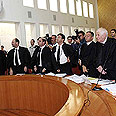
Court serving the government
We must rein in the Supreme Court before it is too late
The Chief Justice didn't like the hot potato he got four years ago: David Axelrod, convicted of offenses committed under the directive to prevent terrorism for comments he made on the radio following the murder of Yitzhak Rabin.
He appealed his conviction, but nothing helped – not freedom of speech, nor the claim that the order to prevent terrorism falls on terror organizations, not on individuals.
But Axelrod didn't give up. Once it became clear to him that the Supreme Court created a new law with regard to Mohammed Yousef Jabarin, an Arab poet from Umm al-Fahm who praises terrorist murder in his poems, he demanded a retrial. Aharon Barak didn't like the request, to put it mildly, and sent the appealer to request a presidential pardon.
The prosecution agreed, but Moshe Katsav, himself a well-worn politician who probably has plans of returning to politics, understood that one doesn't play games with the Rabin assassination.
He rejected the request for a pardon. Now, Chief Justice Barak has no choice, and on the eve of the Sukkot holiday, despite the unfortunate timing – a few days before the tenth anniversary of the Rabin murder – Barak asked Attorney General Menachem Mazuz to acquit Axelrod.
If Mazuz refuses, Barak will order a re-trial.
Sad light
The case sheds a bit of a sad light once again on the justice department. These things were said mainly in light of Dr. Avital Molad's words in recent days in an internal memo prepared by the public defender: Important rights of the suspected and the accused were sacrificed on the altar of the Gaza disengagement.
New laws were created in on order to silence people and block legitimate acts of protest. Courts, prosecutors and the police simply lent a hand to destroy everything that took years of toil to build: A well-run country that respects the legal rights of its citizens.
Back to the dark days
To read Dr. Molad and to see the Chief Justice's actions with regard to Axelrod just about brings one to his knees in order to avoid the need to admit there is clear discrimination under his shadow, returns many to the dark days of the Oslo agreements.
The Shin Bet security service, with the knowledge of the state prosecutor, employed at least one provocateur, perhaps more than one, in order to slander the reputation of the right.
Avishai Raviv, even according to the Shamgar Commission, worked in a way more suitable to non-democratic countries. Everything was permissible in order to stifle legitimate opposition to a diplomatic process that now appears like a forgery.
During those days of huge demonstrations against government diplomacy, the attorney general, heads of the Shin Bet and many others in the security establishment simply employed means acceptable only in fascist dictatorships.
At the end of the day, Prime Minister Rabin was murdered by someone very, very close to a Shin Bet double agent, which proves their strike on democratic principles could boomerang back on those parts of the security establishment who don't reject those measures.
Political court
But no one has learned the lessons, and, as we said, the same disgusting phenomenon has repeated itself in recent months.
Thousands were arrested illegally. The Supreme Court approved legal and political processes that cement its position as an arm of power, rather than as an independent judicial authority.
Many, perhaps, don't yet really feel the touch of the judicial apparatus that has sprung up – predatory, unafraid of draconian measures.
But now it is clear that we must rein the court in before it is too late. There can be no more question that if the other branches of government are corrupt, odds are that there is also corruption in the judicial establishment.
These issues came to light recently, when two justices were nabbed for misconduct. But we mustn't indulge in fantasy: They are certainly not the only ones in the Pandora's box. Extracting them, perhaps, would calm the winds for a short time, but the answer must be for the long term.
Only a change in the method of electing judges and limiting their tenures – as is done with other officials, such as the president, IDF chief of staff and state comptroller – can bring back the faith in the law enforcement establishment, faith that without which there can be no country of law and order.
Haim Misgav is a lawyer










